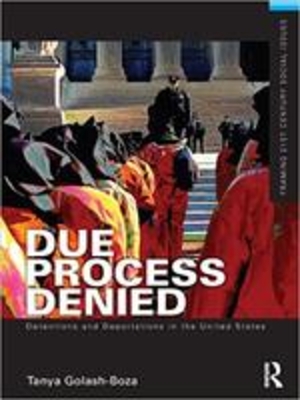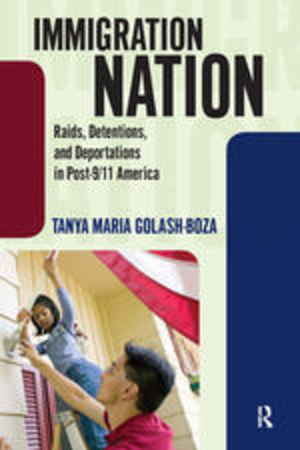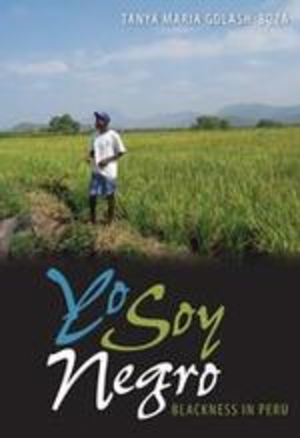In Mexico and Peru, denigrating racial humour about blacks and indigenous populations is prolific, despite the existence of colour-blind national ideologies (which minimize or negate the existence of racism) and social norms that silence various forms of race talk. This article draws on interviews and participant observation from these two countries to analyse the popular uses and interpretations of racial humour, and their consequences for racial ideology. We illustrate how racial humour serves to reproduce Mexican and Peruvian national ideology and reinforces the countries’ racialized systems of domination. In this article, we identify three mechanisms involved in this process: ‘going along’ with jokes; framing racial humor as benign; and using laughter to ‘soften’ racism. Taken as a whole, our analysis reveals how racial humour works to maintain colour-blind ideology.
Publications
2013
2012
Due process protections are among the most important Constitutional protections in the United States, yet they do not apply to non-citizens facing detention and deportation. Due Process Denied describes the consequences of this lack of due process through the stories of deportees and detainees. People who have lived nearly all of their lives in the United States have been detained and deported for minor crimes, without regard for constitutional limits on disproportionate punishment. The court’s insistence that deportation is not punishment does not align with the experiences of deportees. For many, deportation is one of the worst imaginable punishments.
Immigration Nation provides a critical analysis of the impact that U.S. immigration policy has on human rights. In the wake of 9/11, the Department of Homeland Security was founded to protect America from the threat of terrorist attacks. However, along with dramatic increases in immigration law enforcement raids, detentions, and deportations have increased six-fold in the past decade American citizens, families, and communities have ultimately borne the cost. Although family reunification is officially a core component of U.S. immigration policy, these same policies often tear families apart. Pundits and politicians nearly always frame this debate in terms of security and economic needs, but here, Tanya Maria Golash-Boza addresses the debate with the human rights of migrants and their families at the center of her analyses.
In this essay, I consider what a sociology without borders would look like through an exploration of two questions: 1) How can sociology be mobilized to make the world a better place? and 2) What does a sociology of human rights look like? To answer these questions, I take the reader through a discussion of the history of Sociologists without Borders, the influence of Professor Judith Blau, and my own excursions into the sociology of human rights in the United States and abroad.
Human rights declarations provide the right for any person to leave their country, yet do not provide the right to enter another country, stopping halfway in asserting a right to mobility. In this article we provide evidence that 1) state policies and actions create migration flows; 2) migrants often travel to fulfil their human rights; and 3) current restrictions on immigration curtail migrants’ human rights. We argue, based on sociological evidence, that the right to mobility is a fundamental human right, and deserves a place in human rights doctrine.
Due process protections are among the most important Constitutional protections in the United States, yet they do not apply to non-citizens facing detention and deportation. Due Process Denied describes the consequences of this lack of due process through the stories of deportees and detainees. People who have lived nearly all of their lives in the United States have been detained and deported for minor crimes, without regard for constitutional limits on disproportionate punishment. The court’s insistence that deportation is not punishment does not align with the experiences of deportees. For many, deportation is one of the worst imaginable punishments.
In the wake of September 11, 2001, the Department of Homeland Security (DHS) was created to prevent terrorist attacks in the US.This led to dramatic increases in immigration law enforcement - raids, detentions and deportations have increased six-fold. Immigration Nation critically analyses the human rights impact of this tightening of US immigration policy. Golash-Boza reveals that it has had consequences not just for immigrants, but for citizens, families and communities. She shows that even though family reunification is officially a core component of US immigration policy, it has often torn families apart. This is a critical and revealing look at the real life - frequently devastating - impact of immigration policy in a security conscious world.
2011
Yo Soy Negro is the first book in English—in fact, the first book in any language in more than two decades—to address what it means to be black in Peru. Based on extensive ethnographic work in the country and informed by more than eighty interviews with Peruvians of African descent, this groundbreaking study explains how ideas of race, color, and mestizaje in Peru differ greatly from those held in other Latin American nations. The conclusion that Tanya Maria Golash-Boza draws from her rigorous inquiry is that Peruvians of African descent give meaning to blackness without always referencing Africa, slavery, or black cultural forms. This represents a significant counterpoint to diaspora scholarship that points to the importance of slavery in defining blackness in Latin America as well as studies that place cultural and class differences at the center of racial discourses in the region.
2010
In 2006, the Peruvian government passed a law that made racial discrimination a crime punishable by incarceration. This law, part of a multicultural reform in Peru, can be seen as an effective recognition of the reality of racism in Peruvian society. Such recognition, however, contrasts with official depictions of Peru as a country without racism, and of Peruvians as people who deny the existence of racism in their society. Based on semi-structured interviews conducted in Lima, this note explores everyday discourses on this issue. The findings show that Limeños recognize racism as a societal problem, but they adhere to a restrictive definition of racism and use rhetorical strategies that allow them to portray themselves as not racist. Their expressions of distaste for people of color demonstrate that racism persists in interpersonal discourses because of deeply embedded ideas about the inferiority of blacks and Indians.




